India’s innovation ecosystem is the third largest in the world, after the United States and China. More than 50,000 startups have been founded in the past decade, which includes 100 startups that have already reached unicorn status and another 167 soon to be unicorns.
By 2025, Indian startups are expected to number 100,000 and attract $150bn in funding. This growth will represent enormous value for India. It is estimated to exceed $500bn in value creation for the country.
However, Indian corporates will miss out on this enormous opportunity if they do not get involved in corporate venture capital (CVC). The country’s startup ecosystem, similar to others, is primarily fuelled by venture capital funds. Corporates hesitate to follow big-bet VC valuation strategies because of their low risk tolerance.
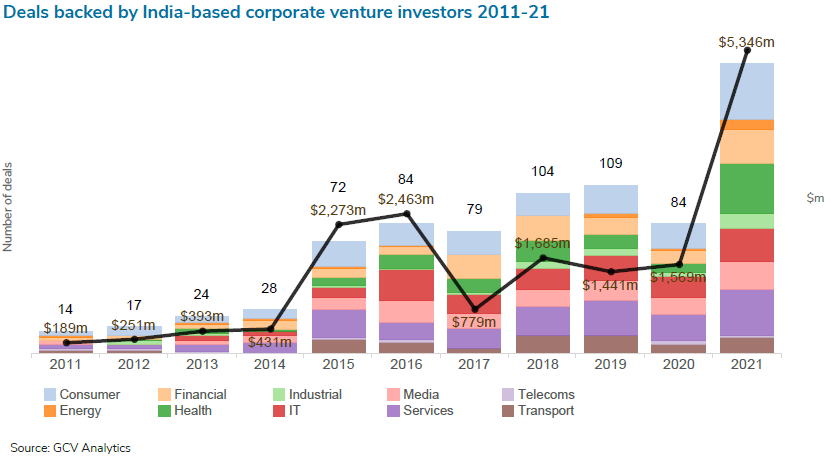
Even though corporates across the globe share this risk aversion, Indian corporates lag behind their counterparts in corporate venturing. GCV Analytics’ data shows only 25% of India’s CVC investment is domestic. While foreign investment powers India’s startup ecosystem, a healthy dose of domestic corporate support can help grow startups and capture their innovation in India.
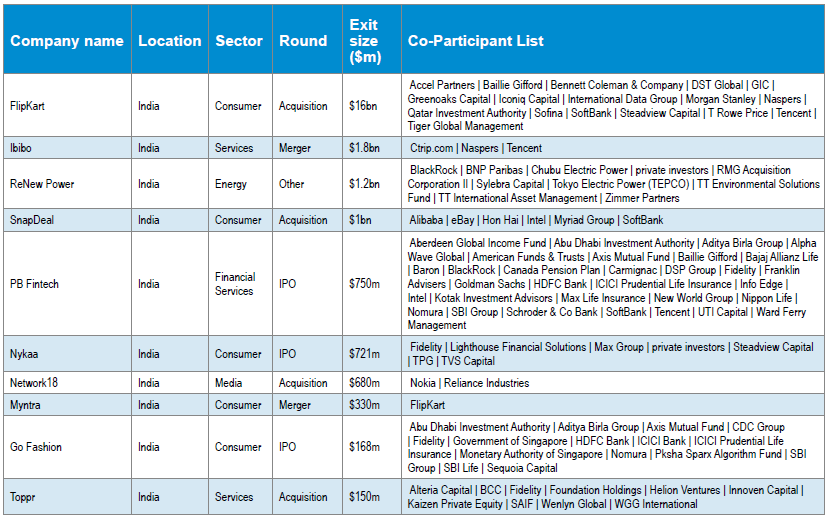
Three overarching barriers hold Indian CVC adoption back. First, there is a lack of awareness and understanding of the CVC investment model. CVC is still a new investment class in India and there is no guide to it.
Corporates must define a concrete structure for their funds to succeed. They can do this by defining an investment thesis that covers strategy and goals, focus areas, processes, and people. Corporates need to understand why and how they are investing, as well as what they want to get from investing in startups before they begin.
The second barrier relates to corporate risk aversion for startup investment. There is a misconception that the main path to startup value is through high-risk VC investment methods. In reality corporates can tap into “startup value” by working on proof of concepts with startups, exchanging knowledge and skills with startups through accelerators programmes, or investing through less risky methods like a fund of funds. There is not a single path to capture startup value.
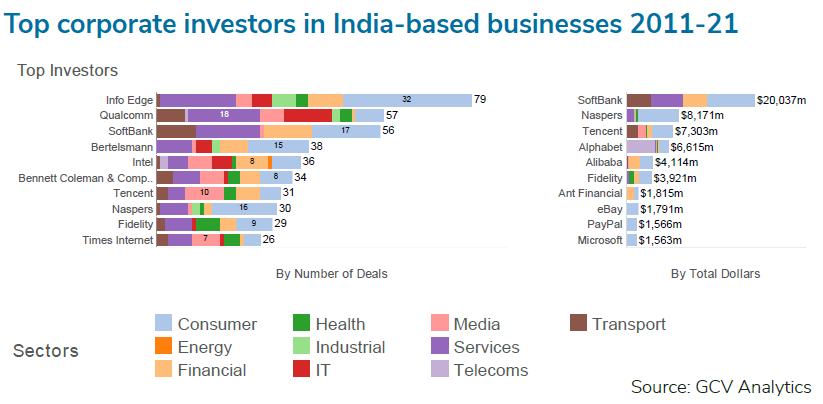
The third barrier is the government’s role in CVC policy and regulation. Corporates can climb over the other two barriers, but without continued progress from the government’s side, efforts will be slow. There are still change to open issues around restrictions on exits, reporting regulations, and the lack of tax parity between listed and unlisted shares. These areas can be solved through specific policy and tax frameworks for CVC, which currently do not exist.
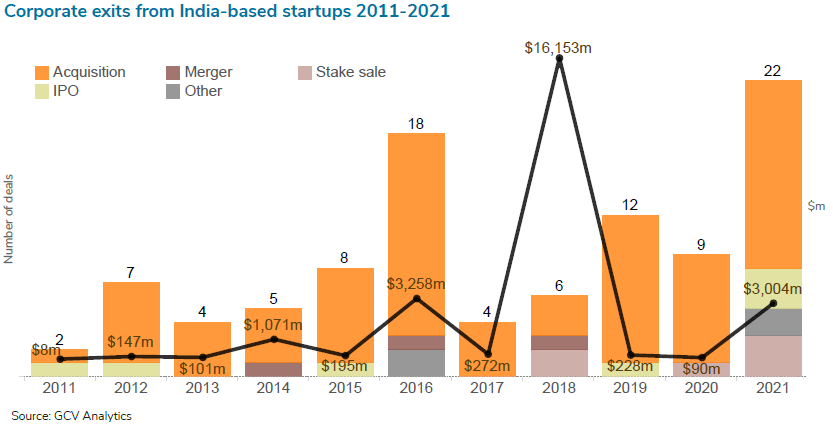
Change from the government will enable Indian CVC to grow with clarity and certainty. There is immense opportunity for corporates to drive the Indian startup ecosystem’s growth while capturing its innovation and financial value.
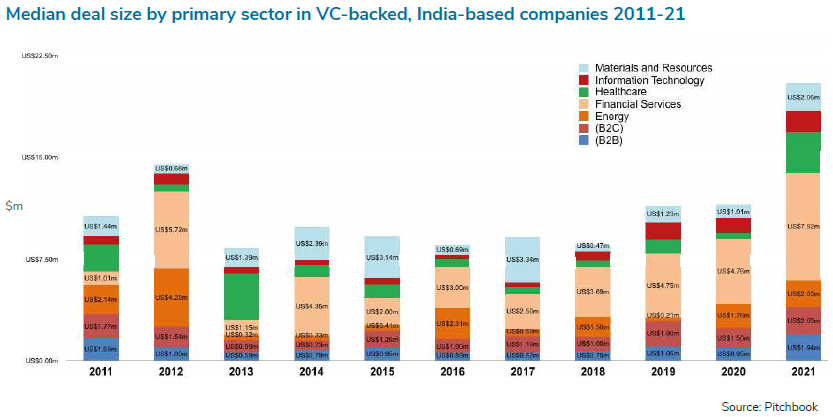
However, this value will not be fully unlocked without increased adoption of CVC by corporates and progress on the governmental side.
The full report can be accessed here.
India’s first CVC-backed deeptech IPO
India-based digital map provider CE Info Systems, known for its brand MapmyIndia and backed by corporate venturing groups Qualcomm and Flipkart, has floated on local stock exchanges giving a boost to a wave of local unicorns (private companies worth at least $1bn) created this past year.
CE Info listed with a premium of 53% to give a market capitalisation of Rs 84bn ($1.1bn).
The stock opened at Rs 1,581 on the BSE against the issue price of Rs 1,033 per share, while on the National Stock Exchange, the opening price was Rs 1,565.
“The issue is valued at 27x 1HFY22 annualised enterprise value or sales, which although expensive is similar to other Indian unicorns,” Motilal Oswal told news provider MoneyControl.
Revenue in financial year 2021 increased to Rs 152.46 crore from Rs 148.63 crore the year before.
Other India-based startups potentially to follow CE Info after receiving unicorn valuations include GupShup, a conversational messaging platform backed by hedge fund Tiger Global Management, Innovaccer, a healthtech startup backed by Microsoft’s M12, and ShareChat, a social media app trying to build India’s largest AI-powered content ecosystem.
In December 2015, local e-commerce company Flipkart was set to acquire a 34% stake in MapmyIndia in a deal that valued the company at about $260m.
Founded in the 1990s, MapmyIndia provides a range of digital mapping services, including global positioning system navigation, geographical information, tracking, and location-based apps and services.
Flipkart aimed to use MapmyIndia’s technology to strengthen its logistics network, and in particular its first-mile pickup and last mile delivery capabilities.
MapmyIndia’s data will also help Flipkart better understand its customer behaviour, which will in turn inform the placement of its hyperlocal distribution and warehouse centres.
MapmyIndia had reportedly raised about $30m prior to the Flipkart investment from Qualcomm Ventures, which invests on behalf of US-based chip maker Qualcomm, and Japan-based mapping company Zenrin.
Qualcomm Ventures said it had led MapMyIndia’s series C round. Varsha Tagare, a managing director at Qualcomm Ventures and who leads a $150m fund dedicated to India and cross border digital enterprise investments, by email said: “We have witnessed MapMyIndia’s digital transition as they moved from building their map database from paper based mapping techniques, to satellites and mobile based mapping techniques.
“The rich mapping database has enabled key projects in the geography such as tower infrastructure rollouts, retail location rollouts and logistics rollouts. Early customers include Coca-Cola India, which began its engagement in order to locate its national network of bottlers, which was important for Coca-Cola India’s legal team. That relationship expanded into geo-locating and mapping its retail network, and then its transport and logistics partners. This was important for Coca-Cola India’s distribution and merchandising teams.
“Indian Space Research Organisation (ISRO) and MapmyIndia announced a path-breaking Aatmanirbhar Bharat initiative (Indian Prime Minister Narendra Modi’s self-reliant India campaign) to partner together to offer India’s best, and fully indigenous, mapping portal and geospatial services by combining the power of MapmyIndia’s digital maps and technologies with ISRO’s catalogue of satellite imagery and earth observation data.
“MapMyIndia has enabled many location-based services enabled by their deep mapping database. Their mapping service is used by enterprises in sectors like automotive. The company’s internet-of-things (IoT) platform InTouch provides APIs to customers like Phonepe and Grofers allowing them to build applications like near, real-time vehicle and asset tracking for fleets, transport and logistics.
Today MapMyIndia also enables maps for Apple and Alexa.
“We have been a long-time investor in MapMyIndia, supporting their journey in becoming a local player with a strong business around digital maps that enable a variety of use cases in various industries including automotive, logistics and IoT. Qualcomm Ventures has a long history of investing in this sector globally including in companies such as Waze.
“We look forward to working with MMI [MapMyIndia] in various segments of auto and IoT and wish them a great journey ahead as a public company!”
